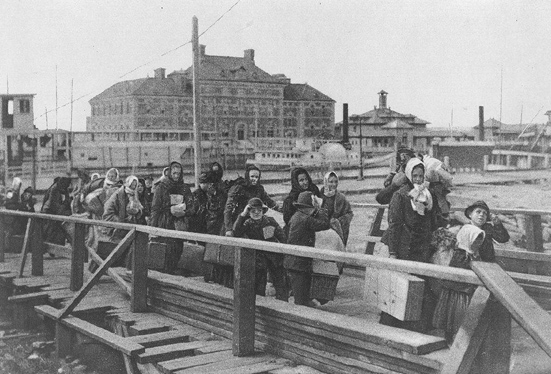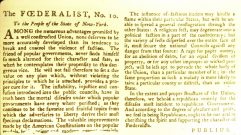An Occupy Wall Street Immigration Policy
The rancor over immigration policy obscures what should be its central concern—the perpetuation of the principles of the Declaration of Independence and the Constitution. Every major immigration reform of the past ninety years, including the Gang of Eight’s bloated proposal, betrays this same deficiency. Each successive law has focused on parts of a policy, emphasizing this or that interest, this or that racial or ethnic preference. Some are worse than others, but all evade what should be the primary concern—the fostering of self-governing citizens.
Critics of the bill before the House rightly assail the mass granting of citizenship, but they haven’t explained the relationship between the formality of citizenship and perpetuation of self-government. Those who advocate expanded immigration correctly tout some undeniable economic benefits, while opponents rightly fear political burdens. (For an incisive appreciation and criticism, see Angelo Codevilla’s post on this site.) But both sides ignore the central concern of perpetuating republican government.[i]
The current immigration stand-off features (to exaggerate only slightly) open-borders libertarians versus armed camp conservatives. A free and prosperous society requires both commerce and national defense. But even the two necessary conditions together, in some sort of a compromise, are not sufficient for healthy political life. Free republican citizenship, a political community of ruling and being ruled, is the sufficient condition. Such a citizenship requires that we are capable of governing ourselves. We admit new Americans into our society not because they make us more prosperous or because our compassion needs some worthy object but so the new citizens enable us to govern ourselves better than we did before.
 Republican self-government requires a particular culture for it to flourish. In Democracy in America Tocqueville describes the political experience, enlightenment, and religious faith that produced the mores of the independent though communal citizens he admired. At one time, self-selecting immigrants would be one major resource for this culture. Tocqueville praised the unruly Irish Catholic immigrants as the “most republican” of Americans.
Republican self-government requires a particular culture for it to flourish. In Democracy in America Tocqueville describes the political experience, enlightenment, and religious faith that produced the mores of the independent though communal citizens he admired. At one time, self-selecting immigrants would be one major resource for this culture. Tocqueville praised the unruly Irish Catholic immigrants as the “most republican” of Americans.
But the Progressives, many of whom espoused eugenicist policies, rejected Tocqueville’s moderation (and warning against bureaucratic government) by imposing Americanization programs on new immigrants. At least this reflected a confidence in America, even as it produced a more meddlesome and dangerous government. In his War Message, Woodrow Wilson warned ethnic Germans to be patriots or suffer dire consequences. Franklin Roosevelt eschewed warnings and relocated ethnic Japanese, two-thirds of whom were citizens—a frequently misunderstood episode I have discussed on this site before. Progressive policies continue to rule us in immigration has they do in other features of our political life.
My own mother’s Americanization—her parents were immigrants from Japan—included a rebaptism from her first grade teacher who declared her given name unpronounceable and renamed her Mary, as she was known from then on. Similarly, the writer Richard Rodriguez was cleaved from Ricardo, torn from the warmth of his family and assumed, in his retelling, an anodyne public identity. Contemporary insistence on bilingualism and multiculturalism would doubtless punish such impositions of public identity.
Whatever their motives, these policies and others preceding Progressivism diluted ethnic cohesion and thereby shaped an American identity, one of a nation of citizens, not a federation of tribes. In order to assure that you would be judged by who you are and not where you came from, you had to discard old loyalties. But would it take something as drastic as the World War II relocation of Japanese to assimilate the current tribes of illegal immigrants? Can we force unenlightened aliens to be free?
In contrast to Progressive policies, the slavery crisis can offer sounder principles about how to think about immigration. The ultimate argument against slavery was not its economic irrationality or even its cruelty but its crippling of our ability to govern ourselves. Any prosperity that slavery brought to a nation was beside the point, as enjoyable as it might be for those who shared in it. For Lincoln, slavery meant “You work, I eat”—the core of tyranny. Similarly, “border security” exists for a purpose and must contribute to self-government. It’s easy enough to build a fence or fly drones. We defend ourselves against foreign enemies so we may enjoy the blessings of liberty.
In campaigning for immigrant votes, Lincoln ridiculed Stephen Douglas’s narrow reading of the Declaration as applying to the British: “The English, Irish and Scotch, along with white Americans, were included to be sure, but the French, Germans and other white people of the world are all gone to pot along with the Judge’s inferior races.” This was the consequence of Douglas’s exclusion of blacks from “all men are created equal.” Lincoln’s campaign tactics brought immigrants and native-born alike closer to their country, while assailing the worst tribalism in America, racial slavery.
Similarly, immigration policy can affirm or undermine the founding principle of the country. As the Gettysburg Address poetically expresses, each generation has the responsibility of affirming and transmitting the “proposition that all men are created equal.” And that means recognizing and opposing the enemies of that proposition, which includes the multiculturalism that promotes tribalism.
One means of detaching immigrants from their land of origin would be the Congressman Steve King’s reviled Dream Act. Giving younger illegal aliens who were brought into this country by their parents residence status for higher education benefits in their State of residence would be a means of attaching them closer to America. We must also keep in mind Peter Skerry’s warning of the political corrupting effects of multicultural higher education on Latinos.
In another era Tocqueville had wisely advised, “Give democratic peoples enlightenment and freedom and leave them alone.” Even then it was not sufficient to allow men to be free—their freedom had to be enlightened. The pioneer clearing forest was the distillation of 18 centuries of civilization. We cannot say the same of today’s immigrants or even of our own citizens.
Citizen duties become clearer from the citizen’s oath:
I hereby declare, on oath, that I absolutely and entirely renounce and abjure all allegiance and fidelity to any foreign prince, potentate, state or sovereignty, of whom or which I have heretofore been a subject or citizen; that I will support and defend the Constitution and laws of the United States of America against all enemies, foreign and domestic; that I will bear true faith and allegiance to the same; that I will bear arms on behalf of the United States when required by the law; that I will perform noncombatant service in the armed forces of the United States when required by the law; that I will perform work of national importance under civilian direction when required by the law; and that I take this obligation freely without any mental reservation or purpose of evasion; so help me God.
Rejecting monarchical or non-republican governments and willing to risk one’s life for the “Constitution and laws of the United States,” a citizen will also “perform work of national importance … when required by law….” Such deeds affirm the citizen’s “truth faith and allegiance” to the Constitution and laws” and their defense against “enemies, foreign and domestic.” Such enemies would have to include not just terrorists, for example, but anti-republican ideological doctrines as well—viz. multiculturalism. The immigrant has a high formal threshold to meet.[ii] The oath shows we are not yet an open city. The immigration crisis is not having too many immigrants but rather not having enough Americans.
And immigrants have informal duties as well. As Princeton professor Robert George has counseled, immigrants, like other guests, should show gratitude toward their hosts. With this obligation in mind we can respond to David Brooks’ protest that “Before Asians, Hispanics and all the other groups can be won with economic plans, they need to feel respected and understood by the G.O.P.” But why should they respect a nation (forget the GOP) that shows little pride in its principles, has even less knowledge of them, and offers lots of free stuff? An Occupy Wall Street immigration policy that asks for nothing will receive even less in return.
[i] For the most thoughtful reflections on both the burdens and benefits of illegal immigration, see Victor Davis Hanson, Mexifornia: A State of Becoming (New York: Encounter Books, 2007, 2003). Hanson views the changes immigration has wrought on him as a citizen, taxpayer, professor, and Selma, California, vines farmer.
[ii] And immigrants, contrary to the myth of super-loyalty, do not feel the same attachments as native-born citizens. See the poll analysis by John Fonte and Althea Nagai, my wife. http://www.hudson.org/files/publications/Final04-05.pdf
